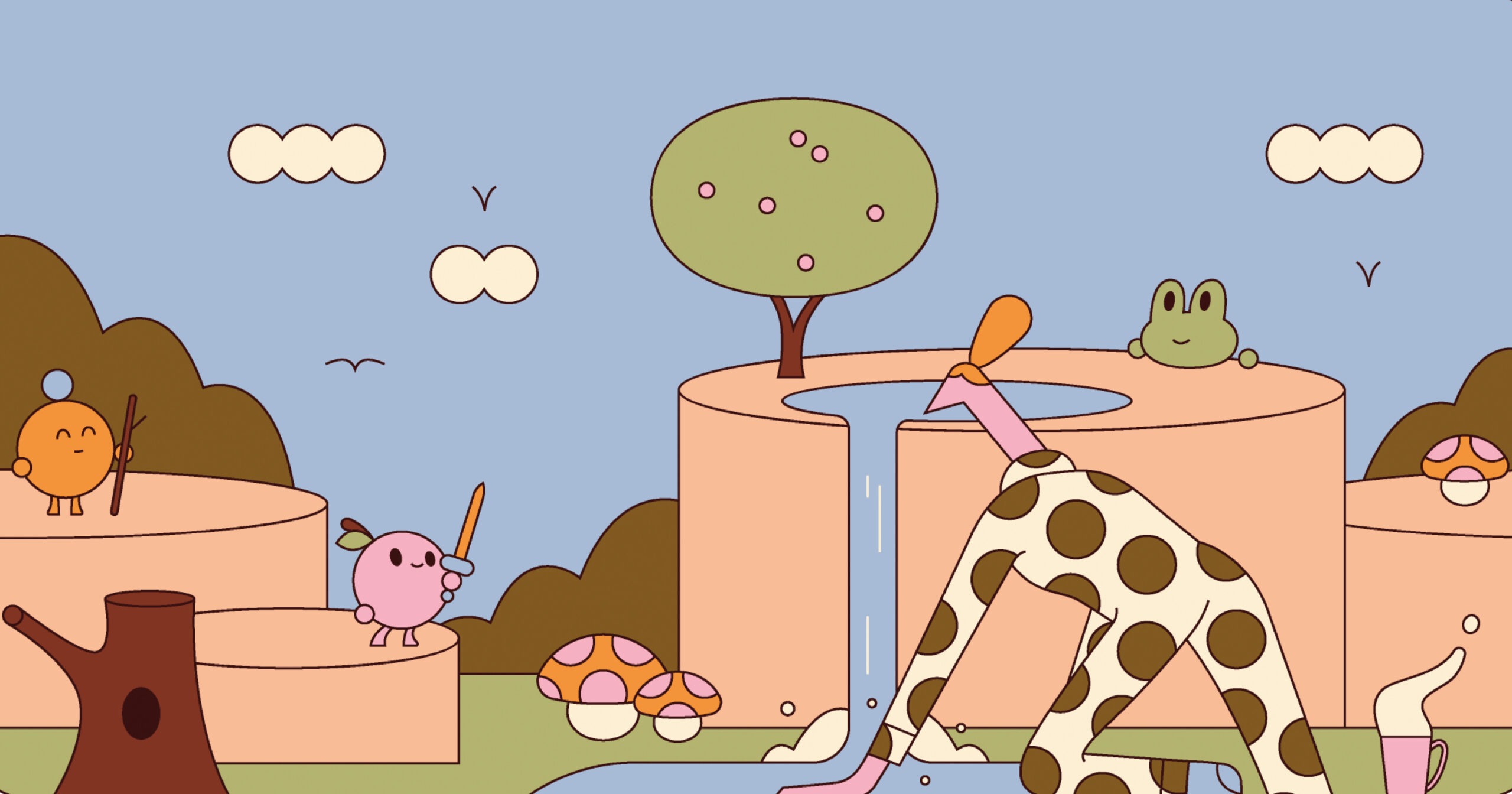Tired but happy from a day spent working in the fields, you sit on the warm porch of your dream farmhouse, listening to the gentle rumble of cicadas in the trees, and watch as the golden sun slips below the horizon.
This blissful scene might sound a world away from your living room sofa, especially as the cold weather and dark evenings creep in, but the touch of a button is all it takes to transport you there.
Cosy gaming, a style of slow-paced, low-pressure video games focused on relaxation and comfort, has been rising in popularity since the pandemic. Last winter, Google searches for ‘cosy game’ were at a five-year peak. Unlike other genres, cosy games aren’t about winning, but about taking pleasure in simplicity. Common themes are organising belongings, simple puzzles or enjoying carefree virtual activities such as fishing or cooking. The popular Animal Crossing: New Horizons involves building a community on a tropical island. In Stardew Valley, you inherit your grandfather’s farm and must make it a thriving business with the help of friendly local villagers.
‘These types of games can reduce stress hormone levels, lower heart rate and mimic some benefits of meditation,’ says Holly Schriff, a licensed clinical psychologist and self-professed gamer based in Connecticut, US. ‘Engaging in these virtual tasks can provide a comforting sense of accomplishment and escapism, which helps to temporarily relieve mental and emotional burdens from the real world.’
A space to escape
Unlike real life, which can feel stressful, uncertain and sometimes overwhelming, cosy games offer time away in a safe and friendly world.
Jared Widdison is a mental health social worker at Therapy Pro, an allied health and therapy provider in Australia. He enjoys playing cosy games, as do some of his clients, who use them to unwind during challenging times. ‘It’s a nice escape from the real world and the pressures of being an adult,’ he says.
According to Jared, they can also help instil a sense of control over your environment. Games that focus on organisation and tidiness are one example. In Unpacking, you empty boxes following a house move, neatly tidying away belongings to a soothing, almost meditative soundtrack.
‘It’s like that feeling you get when you’re cleaning,’ says Jared. ‘You’re watching your environment become organised and clear. It parallels the brain a little bit. It relaxes the person, because they can see things becoming more structured and predictable.’
Perhaps tellingly, interest in cosy games accelerated during the pandemic. Animal Crossing: New Horizons, which was released in March 2020, sold more than 13 million copies in Japan, the US and Europe within its first six weeks. Jared thinks the surge in popularity was linked to the secure and predictable environment they provided, during a time of world turmoil.
Part of this escapism is the genre’s focus on simple, low-pressure tasks that release feel-good hormones when achieved. In Garden Life, for example, a game where you regenerate a virtual community garden that’s fallen into disrepair, you complete a to-do list that includes clearing rubble, growing flowers and opening a market stall.
‘Completing small goals such as harvesting a crop, furnishing a home or running a virtual bakery or restaurant taps into the brain’s reward systems, releasing dopamine and contributing to a feeling of joy, accomplishment and motivation,’ explains Holly. ‘The satisfaction a player gets from completing a manageable and achievable goal can be highly validating and can improve one’s self-esteem and overall mood.’
Relax and unwind
When done in moderation, gaming can also help to reduce stress. Research published in JMIR Mental Health found that playing digital games after work could be a more effective stress-reliever than using mindfulness apps. The authors of the study noted that digital games appear to fulfil four key criteria necessary for post-work recovery: they tend to be relaxing, they provide opportunities for mastering a new skill, they are highly immersive and distracting and they allow people to feel in control.
Kennedy Rose, 29, found joy in gentle low-stakes video games when she was young. During law school, a particularly high-pressure time, she became drawn to them again. ‘I rediscovered my love for those types of games as a way to unwind and reset my nervous system after a long, stressful day,’ she says.
Based in California, Kennedy now shares her love of the genre through social media and her YouTube channel, where she’s known as Cozy K. She describes cosy gaming as a key part of her self-care routine. ‘[Cosy games] give me a space to regulate and process my emotions in a healthy way, almost as a safe, meditative space,’ says Kennedy. ‘After a day of working or feeling overwhelmed by the world, slipping into a slow-paced game feels like an exhale.’
Creating together
While gaming may seem like a solitary activity, it doesn’t have to be. You can play with friends and connect over a shared hobby. Many games also feature in-world virtual characters to befriend, through interactions that often centre around kindness and helping one another.
‘Games like Animal Crossing allow a player to build relationships with kind and quirky neighbours who consistently offer positive interactions, encouragement and gentle humour. This helps reinforce feelings of community and companionship, particularly for those who may feel isolated,’ says Holly.
‘Virtual friendships with characters shouldn’t replace real-world relationships,’ she adds, ‘but they can definitely add a meaningful layer of connection and emotional warmth to a player’s life.’
Cosy games also allow you to get creative and customise your virtual world – be it designing your own island, home, farm or restaurant. ‘Cosy gaming offers a fantastic outlet for creativity… allowing the player to express themselves freely without fear of judgment or failure,’ says Holly.
Starting out
Getting into cosy gaming is easy, and there’s no right or wrong way to approach picking your first game. Search YouTube for reviews to see which one might suit you best. While the Nintendo Switch is a popular console, you can also get cosies on other consoles, or on your smartphone or tablet.
‘It’s less about “winning” and more about immersing yourself in a peaceful setting,’ says Kennedy. ‘I’d start by thinking about the kinds of real-life activities you enjoy. If you love gardening, try Botany Manor, Stardew Valley or Wylde Flowers. If you love baking, try Calico or the more fast-paced Lemon Cake. If you want to befriend forest creatures, try A Short Hike.’
Setting your personal environment ensures you get the most from a relaxing gaming session. ‘I like to treat my cosy gaming time like a little ritual,’ says Kennedy. ‘Soft lighting is key, so I’ll usually turn on a warm lamp and light a candle. A comfy blanket and snacks are absolutely necessary! Having a dedicated space, no matter the size, is important for separating your everyday life from your relaxation space.’
While screen-time often gets a bad rap, gaming in moderation can be a valuable part of a self-care routine. ‘There is no reason to feel guilty about enjoying cosy gaming, provided it is done with moderation and intention,’ says Holly. ‘Cosy gaming can be a highly beneficial and meaningful form of self-care, as long as people listen to their own needs, establish healthy boundaries around screen time and prioritise overall balance in their lives.’
How to play cosy games with intention
Escape, not avoidance
Gaming should always be a fun, temporary escape and not an avoidance tactic. Jared suggests regularly monitoring your real-world goals to ensure gaming isn’t interfering. ‘Be mindful about what’s important, write it down and try to come up with a good way to progress towards those goals.’
Stay present
Mindful gaming means being present and really engaging with what you’re playing. Emma Palmer-Cooper, a research psychologist based in Southampton, says: ‘This can be done by paying attention to aspects of the game such as colours, music and surroundings. How do they make you feel? And how do you feel after gaming? This can help you understand which aspects are benefiting your wellbeing and which are not.’
Take regular breaks
Stop for at least one 10-minute break an hour. Give yourself a finish time and set an alarm on your phone to remind yourself. Emma says: ‘You might also plan something for afterwards, like making a cup of tea, a quick walk or a necessary chore, to help you step away when the time comes. These small, intentional actions can make a big difference in keeping gaming a positive part of your day.’
Switch off before bed
Put screens away at least one hour beforehand. ‘Part of good sleep hygiene is giving your mind and body the signals that it’s time to rest,’ says Emma.
To contact Holly Schiff, visit southcountypsychiatryri.com.
Follow Kennedy Rose on Instagram @cozy.games and on YouTube @CozyK, and find Therapy Pro at therapypro.com.au
Emma Palmer-Cooper blogs at emmapalmercooper.co.uk/blog


